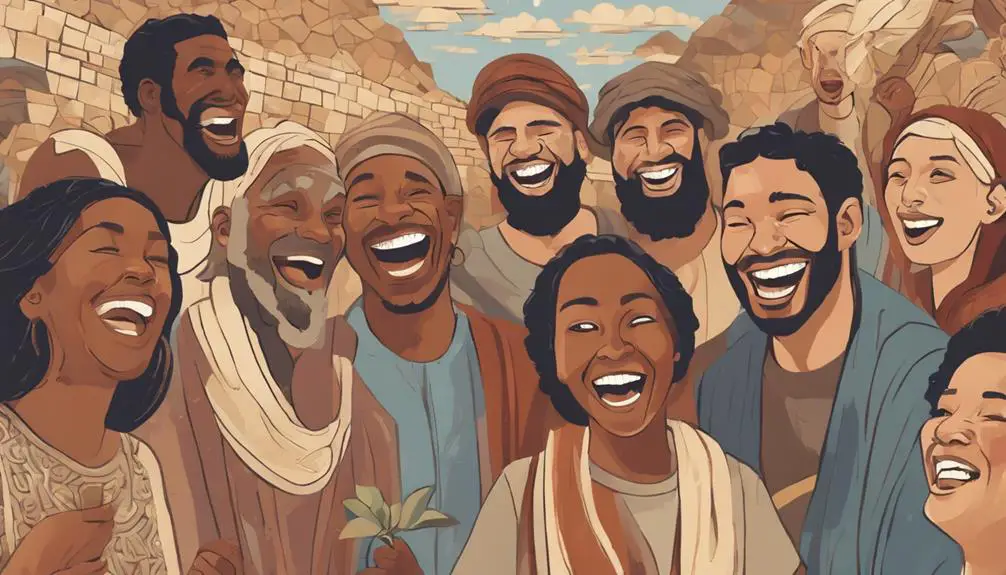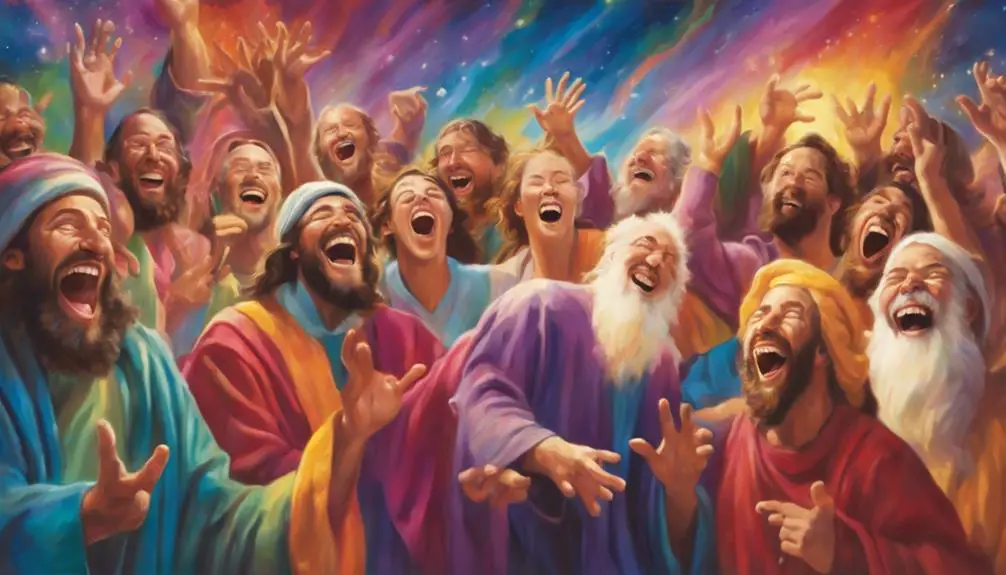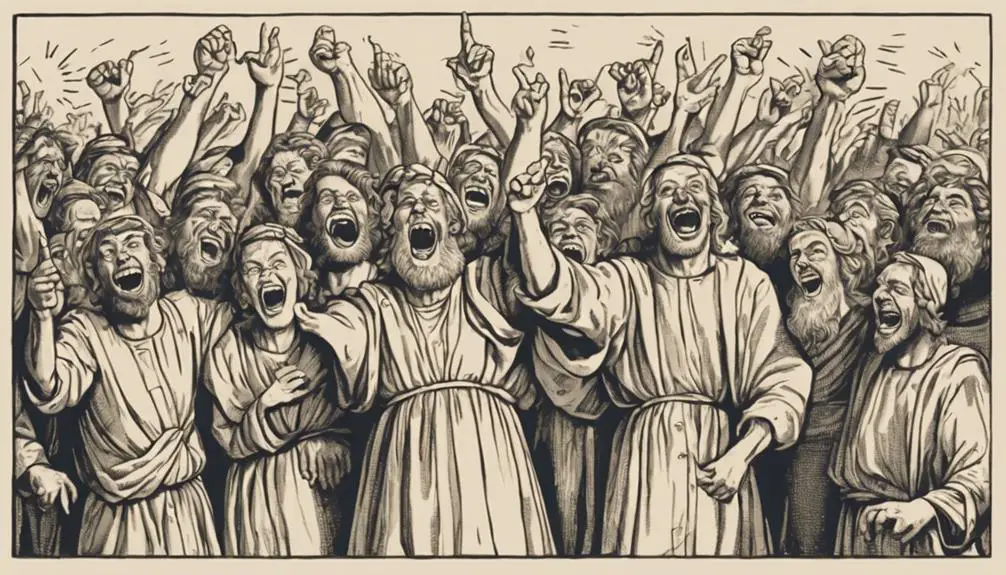Yearn to uncover the profound symbolism of laughter in the Bible? Explore its varied expressions from joy to divine mirth and more.

Types of Laughter in the Bible
Remember when Sarah laughed in disbelief at the prophecy of her bearing a child in her old age? It's one of many instances where the Bible uses laughter to convey more than just humor.
The Bible is rich with various types of laughter, each carrying distinct meanings and implications. From expressions of joy to mockery, skepticism, surprise, and even divine laughter, it's fascinating how this seemingly simple human expression has such profound symbolism.
Want to explore this further? You'll be surprised how much you can uncover.
Key Takeaways
- Laughter in the Bible can represent joy, showcasing spiritual fulfillment and divine delight.
- Biblical laughter can also serve as a tool of mockery, illustrating scorn and human arrogance.
- Skepticism towards God's promises or authority is often expressed through laughter in Biblical narratives.
- Divine laughter in the Bible symbolizes God's joy, sovereignty, and capacity for both delight and derision.
Laughter as an Expression of Joy

Exploring laughter as an expression of joy in biblical context, we discover its profound significance in demonstrating the sheer delight and satisfaction found in divine encounters and spiritual fulfilment. Laughter, when viewed within the scope of joyful celebration, transcends the mere physiological response and becomes a spiritual delight, an echo of divine joy reverberating through human hearts.
A detailed analysis of biblical passages reveals laughter as an expression of the God-given joy of salvation, the exuberant response to God's deliverance. In the book of Psalms, for instance, you'll find verses like Psalm 126:2: 'Then our mouth was filled with laughter, and our tongue with shouts of joy.' Such verses illustrate the sheer ecstasy of those who've experienced God's redemptive power, their laughter a spontaneous outpouring of inner jubilation.
However, biblical laughter isn't confined to personal joy. Communal laughter, too, is a significant aspect of spiritual delight. Throughout the Bible, you'll find instances where laughter is shared collectively, as in joyful celebrations— a testament to the communal aspect of faith. It's a laughter born of shared victories, shared blessings, and shared hope— a spiritual unity expressed through joy.
Mockery and Derision in Laughter

While laughter often symbolizes joy and communion, it's also used in the Bible to convey mockery and derision, shedding light on the complex nature of this seemingly simple human response. In numerous instances, laughter is employed as a weapon of scorn, belittling the object of derision, thus illustrating the darker side of human nature.
Consider the following examples:
- Mocking Prophets: In the book of 2 Kings, Elisha, a prophet of God, was ridiculed by some youths, resulting in severe divine punishment.
- Derisive Laughter Consequences: In the story of Sarah and Abraham, Sarah's scornful laughter at God's promise of a child in her old age led to her being reprimanded by God.
- Laughter as a tool of humiliation: The laughter of the Philistines at Samson in the book of Judges is an example of derisive laughter used to degrade.
- Laughter as disbelief: In the book of Job, Job's friends laugh at his calamity, expressing disbelief at his predicament.
These instances demonstrate how laughter, typically associated with mirth and joy, can be twisted into a tool for mockery and derision, highlighting the multifaceted nature of laughter in biblical narratives.
Laughter Portraying Skepticism

In the Bible, laughter often serves as an expression of skepticism, casting doubt on God's promises or the credibility of His prophets. This type of laughter, often referred to as 'Doubting Laughter,' represents not joy, but rather disbelief and the questioning of divine authority and representation.
You'll find a vivid illustration of this skepticism display in Genesis 18:12, where Sarah, the wife of Abraham, laughs within herself upon hearing the promise of having a son in her old age. Her laughter isn't a joyful response, but a skeptical one, revealing her doubts about the possibility of such an event.
Another instance is seen in Job 12:4, where Job laments that he, a just and blameless man, has become a laughingstock due to his misfortunes. His friends' laughter mirrors their skepticism about his integrity and righteousness.
In both cases, laughter is used as a tool to echo the human tendency to doubt, question, or even deride what seems improbable or impossible. This 'Doubting Laughter' serves as a powerful testament to the Bible's ongoing commentary on human skepticism and faith.
Laughter Signifying Surprise

Beyond its role as an emblem of skepticism, laughter in the Bible also symbolizes surprise, often manifesting during unexpected moments of divine intervention or revelation. This form of laughter, tied to Surprise Laughter Instances, isn't of mockery or disbelief, but of astonishment and wonder, revealing Biblical Surprise Reactions in the face of the unexpected.
To deepen your understanding, we'll explore key instances where surprise laughter is evident:
- In the story of Sarah and Abraham, Sarah's laughter is a manifestation of surprise and disbelief at the news of her forthcoming pregnancy.
- When God unexpectedly answers Job's pleas, Job's laughter symbolizes his surprise and relief.
- In Proverbs, the laughter of a fool is presented as a surprise reaction to wisdom he can't comprehend.
- The laughter of the righteous in Psalms is a response to the surprising victory God brings them over their enemies.
Recognizing these instances of surprise laughter in the Bible enriches our understanding of the multifaceted use of laughter throughout biblical narratives. It's a tool, not only for expressing joy and skepticism, but also for conveying surprise at God's unexpected interventions.
Divine Laughter in the Bible

Shifting our focus, let's now explore the concept of divine laughter in the Bible, a theme that presents yet another layer of complexity to our understanding of laughter's role within these sacred texts. Divine humor is a remarkable but often overlooked aspect of biblical literature. It's not simply God chuckling at human folly but a profound form of communication, reflecting divine sovereignty and judgement.
Laughter's symbolism in this context is multifaceted. It can denote divine joy, as seen in Zephaniah 3:17, where God rejoices over his people with gladness, or divine derision, as reflected in Psalms 2:4 where God laughs at the vain plans of the wicked. These two examples illustrate that divine laughter is neither trivial nor unidimensional; it's a potent narrative tool that underscores significant theological truths.
Moreover, divine laughter challenges our preconceptions of God's character. It reveals a God who's capable of delight, yet also one who scoffs at human arrogance. This dual facet, while initially paradoxical, enriches our interpretation of divine humor, urging us to grapple with a God who's both intimately relatable and majestically other.
Frequently Asked Questions
How Has the Interpretation of Laughter in the Bible Evolved Over Time?"
You've observed how interpretations of laughter in the Bible have evolved, haven't you? Initially, laughter symbolism was seen as scorn or derision.
Over time, it's been regarded as joy or divine blessing.
Biblical humor wasn't always appreciated or understood, but now it's recognized as a tool for teaching and reflection.
This evolution shows us the complexity of Biblical texts and our changing perceptions.
Are There Any Particular Biblical Figures Known for Their Laughter or Sense of Humor?"
Yes, there are biblical figures known for their laughter. Sarah's laughter when told she'd bear a son in old age is one instance. It's a laugh of disbelief, but also joy.
There's also the concept of laughing prophets, who used humor and laughter to deliver God's messages. So, you can see humor and laughter have a place in the Bible, often signifying joy, disbelief, and even a tool for divine communication.
What Is the Cultural Significance of Laughter in Biblical Times?"
In biblical times, laughter held significant cultural symbolism. It was not just an expression of joy or amusement, but a complex form of communication. Laughter could symbolize scorn, disbelief, or even divine judgment.
On the other hand, humor's portrayal was subtle, often embedded in narratives or parables, serving to highlight human follies or divine wisdom. It was a nuanced element, reflecting the socio-cultural contexts of that era.
Are There Differences in the Depiction of Laughter in the Old Testament Compared to the New Testament?"
Yes, there are differences in laughter depictions between the Old and New Testaments. Old Testament humor often has a mocking or scornful tone, such as Sarah's disbelief-infused laughter in Genesis.
In contrast, New Testament reveals a subtler form of humor, typically parabolic. Understanding the cultural and historical context of these texts can greatly enhance your appreciation of these nuances.
It's fascinating to track the evolution of laughter throughout these sacred texts.
Has the Concept of Laughter From the Bible Influenced Other Religious Texts?"
Yes, the concept of laughter from the Bible has influenced other religious texts.
You'll find examples of 'Laughter in Parables' and 'Biblical Humor Interpretation' in numerous religious narratives.
These instances of humor provide unique insights into the cultures and beliefs of the time, shaping their interpretation and application to modern religions.
Conclusion
In conclusion, the Bible portrays laughter in various forms; ranging from expressions of joy and surprise, to mockery and skepticism. It even illustrates divine laughter. Understanding these types of laughter enriches your comprehension of biblical narratives.
This multifaceted use of laughter shows the Bible's depth in expressing human and divine emotions, highlighting its relevance in understanding societal norms and behaviors. Thus, laughter in the Bible is more than mere amusement; it's a profound narrative tool.



Sign up